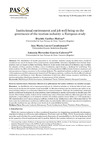Identificador persistente para citar o vincular este elemento:
https://accedacris.ulpgc.es/jspui/handle/10553/53210
| Campo DC | Valor | idioma |
|---|---|---|
| dc.contributor.author | Cuellar-Molina, Deybbi | - |
| dc.contributor.author | Maria Lucia-Casademunt, Ana | - |
| dc.contributor.author | Mercedes Garcia-Cabrera, Antonia | - |
| dc.contributor.other | Garcia-Cabrera, Antonia | - |
| dc.date.accessioned | 2019-02-04T15:38:22Z | - |
| dc.date.available | 2019-02-04T15:38:22Z | - |
| dc.date.issued | 2015 | - |
| dc.identifier.issn | 1695-7121 | - |
| dc.identifier.other | Dialnet | - |
| dc.identifier.uri | https://accedacris.ulpgc.es/handle/10553/53210 | - |
| dc.description.abstract | The distribution of wealth generated in the tourism industry among the labor force should be considered one out of the facets of the social tourism sustainability. Literature highlights that tourism firms' practices have an impact on labor well-being. However, it also warns that national institutions may condition the adoption of these practices by firms, and so institutions might become a challenge for well-being. This study analyzes the effect of institutions on well-being, and particularly it differentiates between employees and entrepreneurs as human resources in the tourism industry. The empirical analysis carried out on a sample of 1,352 employees and 302 entrepreneurs located in 27 European countries, confirms the direct effect of national institutions on well-being at work. Because institutions would have affect human resources' well-being, the tourism authorities should pay attention to the governance of this industry. | - |
| dc.description.abstract | La distribución de la riqueza generada por la industria turística en la fuerza laboral local representa una de las facetas del turismo social sostenible. La literatura destaca que las prácticas que aplica la empresa turística influyen en el bienestar laboral de los recursos humanos. Dado que las instituciones nacionales pueden condicionar la adopción de estas prácticas, tales instituciones pueden representar un desafío para el bienestar. Este trabajo analiza el efecto de las instituciones sobre el bienestar laboral y diferencia para ello entre empleados y emprendedores en la industria turística. El análisis empírico desarrollado con 1.352 empleados y 302 emprendedores en 27 países europeos confirma el efecto de las instituciones sobre el bienestar laboral. Por tanto, como las instituciones condicionan tal bienestar, las autoridades deben prestar más atención al gobierno de aquellas instituciones que afectan a esta faceta de la sostenibilidad turística. | - |
| dc.language | spa | - |
| dc.relation.ispartof | Pasos: revista de turismo y patrimonio cultural | - |
| dc.source | Pasos: Revista de Turismo y Patrimonio Cultural[ISSN 1695-7121],v. 13 (6), p. 1387-1399 | - |
| dc.subject | 531290 Economía sectorial: turismo | - |
| dc.subject.other | Human-Resources Management | - |
| dc.subject.other | Hrm Practices | - |
| dc.subject.other | Entrepreneurship | - |
| dc.subject.other | Strategies | - |
| dc.subject.other | Life | - |
| dc.subject.other | Subsidiaries | - |
| dc.subject.other | Consequences | - |
| dc.subject.other | Health | - |
| dc.title | Institutional environment and job well-being on the governance of the tourism industry: a European study | - |
| dc.title.alternative | Entorno institucional y bienestar laboral en la gobernanza del sector turístico: un estudio europeo | - |
| dc.type | info:eu-repo/semantics/Article | - |
| dc.type | Article | - |
| dc.identifier.doi | 10.25145/j.pasos.2015.13.096 | - |
| dc.identifier.isi | 000377894200008 | - |
| dc.identifier.url | http://dialnet.unirioja.es/servlet/articulo?codigo=5291144 | - |
| dcterms.isPartOf | Pasos-Revista De Turismo Y Patrimonio Cultural | - |
| dcterms.source | Pasos-Revista De Turismo Y Patrimonio Cultural[ISSN 1695-7121],v. 13 (6), p. 1387-1399 | - |
| dc.description.lastpage | 1399 | - |
| dc.identifier.issue | 6 | - |
| dc.description.firstpage | 1387 | - |
| dc.relation.volume | 13 | - |
| dc.investigacion | Ciencias Sociales y Jurídicas | - |
| dc.type2 | Artículo | - |
| dc.identifier.wos | WOS:000377894200008 | - |
| dc.contributor.daisngid | 8687634 | - |
| dc.contributor.daisngid | 3884540 | - |
| dc.contributor.daisngid | 3096913 | - |
| dc.contributor.daisngid | 8067229 | - |
| dc.identifier.investigatorRID | G-1136-2016 | - |
| dc.contributor.authordialnetid | 3641921 | - |
| dc.contributor.authordialnetid | No ID | - |
| dc.contributor.authordialnetid | 3641920 | - |
| dc.identifier.dialnet | 5291144ARTREV | - |
| dc.utils.revision | Sí | - |
| dc.contributor.wosstandard | WOS:Cuellar-Molina, D | - |
| dc.contributor.wosstandard | WOS:Lucia-Casademunt, AM | - |
| dc.contributor.wosstandard | WOS:Garcia-Cabrera, AM | - |
| dc.date.coverdate | Diciembre 2015 | - |
| dc.identifier.ulpgc | Sí | - |
| dc.description.sellofecyt | Sello FECYT | - |
| dc.description.esci | ESCI | - |
| dc.description.dialnetimpact | 0,0 | - |
| dc.description.dialnetq | Q1 | - |
| dc.description.erihplus | ERIH PLUS | - |
| item.fulltext | Con texto completo | - |
| item.grantfulltext | open | - |
| crisitem.author.dept | GIR IUCES: Estrategia y Negocios Internacionales | - |
| crisitem.author.dept | IU de Cibernética, Empresa y Sociedad | - |
| crisitem.author.dept | Departamento de Economía y Dirección de Empresas | - |
| crisitem.author.orcid | 0000-0001-9150-7998 | - |
| crisitem.author.parentorg | IU de Cibernética, Empresa y Sociedad | - |
| crisitem.author.fullName | García Cabrera, Antonia Mercedes | - |
| Colección: | Artículos | |
Citas de WEB OF SCIENCETM
Citations
2
actualizado el 18-ene-2026
Visitas
151
actualizado el 15-ene-2026
Descargas
90
actualizado el 15-ene-2026
Google ScholarTM
Verifica
Altmetric
Comparte
Exporta metadatos
Los elementos en ULPGC accedaCRIS están protegidos por derechos de autor con todos los derechos reservados, a menos que se indique lo contrario.
